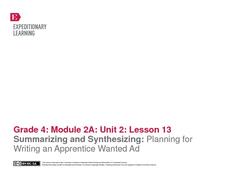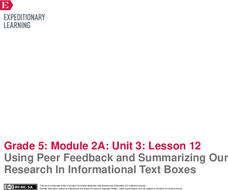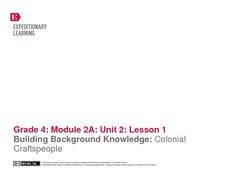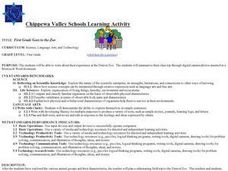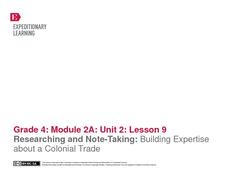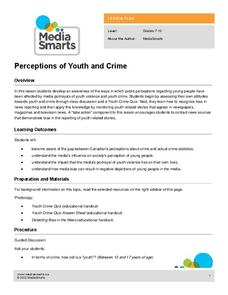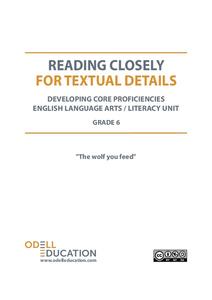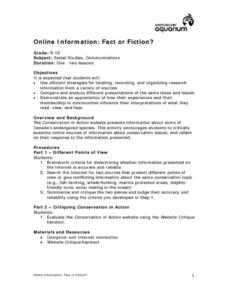EngageNY
Mid-Unit 3 Assessments, Part 2: Summarizing, Analyzing and Discussing Research
Why is reading important? As part of the mid-unit assessment, scholars read, summarize, and analyze an article about the importance of reading. Additionally, they continue their discussion about whether their rules to live by should be a...
EngageNY
Summarizing and Synthesizing: Planning for Writing an Apprentice Wanted Ad
In instructional activity 13 of this unit on colonial trade, young researchers learn about apprentices as they prepare to write help-wanted ads for the specific trade they have been researching. To begin, the class listens closely as the...
EngageNY
Using Peer Feedback and Summarizing Our Research In Informational Text Boxes
Insert text box here. Learners use index cards to create their own informational text boxes. The text box includes information about an insect in the rainforest. Scholars also complete the draft of their research science journal entries.
EngageNY
Mid-Unit 3 Assessments, Part 1: Summarizing, Analyzing and Discussing Research
Speak up and listen up. Scholars participate in a speaking and listening mid-unit oral assessment. They discuss whether their rules to live by should be a personal choice or made into a law, and then they complete an exit ticket to...
EngageNY
Building Background Knowledge: Colonial Craftspeople
In the first lesson plan of this unit on colonial trade, fourth graders gain background knowledge of different jobs performed by early colonists. The class begins with a slide show presentation that includes a variety of great...
Curated OER
First Grade Goes to the Zoo
First graders summarize their trip to the zoo. In this summarizing lesson plan, 1st graders will study animals that they may see at the zoo including their characteristics and habitats. Once the trip is done, they create a word document...
Polk Bros Foundation
Science Learning Summary Guide
Apply reading standards to your science curriculum by asking pupils to complete this guide. Individuals note down important vocabulary as well as two ideas they learned and two supporting facts for each idea. They then take this...
Curated OER
Merging New Technology with Old Stories
Is your city's history a mystery to your class? Ever wonder if your county contains a bounty of folklore? Young computer scientists incorporate technology with time-honored tales during a project with both individual and group...
EngageNY
Introducing New Athletes to Research: Althea Gibson and Roberto Clemente
Let's take a walk! Scholars participate in a gallery walk to view images and text about athletes Althea Gibson and Roberto Clemente. After summarizing the information they've learned, pupils choose which athlete they are interested in...
Media Smarts
Broadcasting Codes
Let your learners be the judges for a series of case studies that focus on broadcast codes in Canada. In order to familiarize your class with the codes and guidelines that govern the broadcasting industry, in particular Canada's...
Curated OER
Annotated Bibliographies
What is an annotated bibliography? While not usually required until college, introducing your juniors and seniors to this type of document will prepare them for their collegiate careers. The term is defined, and the three elements of an...
Polk Bros Foundation
Show, Then Write What You Learn
After reading a text or covering a new topic, have class members fill out the four boxes on this page with facts. Individuals can use words or drawings to represent the facts.
Curated OER
Face to Face Summary!
Students, while in the computer lab visiting the National Geographic Kids website, fill out a checklist of unimportant/redundant information, look for important events and ideas and search for the author's main idea and supporting...
EngageNY
Researching and Note-Taking: Building Expertise about a Colonial Trade
Building on the previous activity in this unit on colonial trade, the ninth activity has young experts continuing their research and writing summaries of the information they find. To begin, children participate in guided practice where...
EngageNY
Listening Closely and Taking Notes: Colonial Trade Podcast About the Wheelwright
Voices from the past. Young scholars listen to a podcast interview with a historical re-enactor as they continue their research in the eleventh instructional activity of this unit on colonial trade. Applying their close reading skills,...
Curated OER
Literature Circle Role Finder
Vocabulary finder, question writer, story mapper and summarizer. Book circle groups spin the role finder wheel to determine their task when the group meets. The template and directions are included on the resource.
Curated OER
Literature Circle Preparation
The secret to a successful literature circle discussion is preparation. Readers prepare for such a discussion by completing a two-page worksheet that asks them to summarize the text, record new words, ask and answer questions, and...
Media Smarts
Perceptions of Youth and Crime
Explore the potential for bias in the news and in scholars' own attitudes and opinions. Begin with a quiz on youth crime to see how learners perceive crime among their peers. After looking at the correct answers, put individuals in...
Odell Education
Reading Closely for Textual Details: Grade 6
Close reading doesn't mean to literally read text close to your face, but rather to pay attention to particular details in order to develop a deep and purposeful understanding of text. The first part of a five-part resource provides an...
Media Education Lab
The Ethics of Propaganda
What are the short and long-term consequences for consumers and producers of modern media propaganda? Class members ponder this essential question as their unit study of ethics of propaganda concludes. After examining two case...
North Carolina State University
Integrating Your Research
Employ this resource to expand efficient ideas on how to present and organize activities that describe how researchers can implement their research by using direct quotes, paraphrasing, and summarizing—without plagiarizing. Activities...
Curated OER
Online Information: Fact or Fiction
Discuss ways to determine if the information middle and high schoolers gather online is accurate. Using the Internet, they cite two sources that show conflicting points of view on a subtopic of conservation. They summarize and analyze...
Curated OER
Kumeyaay Indians
Useful for literary analysis, citing textual evidence, or summary skills, this activity about the Kumeyaay Indians would be a good addition to your language arts class. Middle schoolers read novels and summarize the literature in their...
Newseum
Slanted Facts and Slippery Numbers
The Internet is known as the information superhighway, but sometimes it's hard to know when to hit the brakes on unreliable sources. Using a well-rounded lesson plan, pupils read and summarize articles about the gender pay gap and...
Other popular searches
- How to Summarize
- Summarize a Story
- Literature Circle Summarizer
- Summarize Paraphrase
- Teaching How to Summarize
- Summarize and Paraphrase
- Summarize Reading
- Summarize Story Outline
- Summarize & Strategy
- Summarize Nonfiction
- How to Summarize Fiction
- How to Summarize Reading

